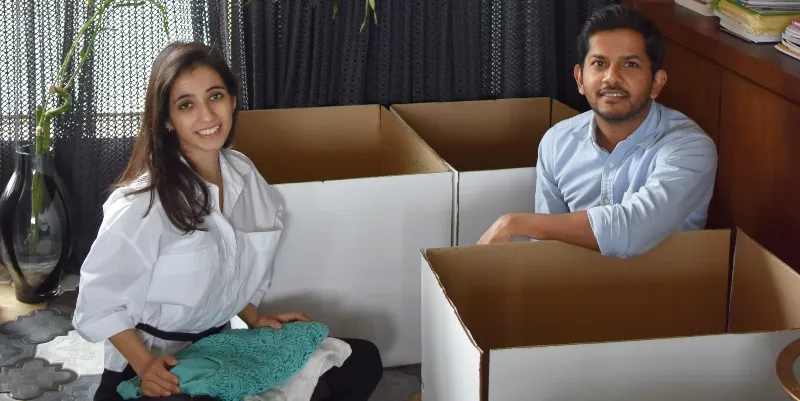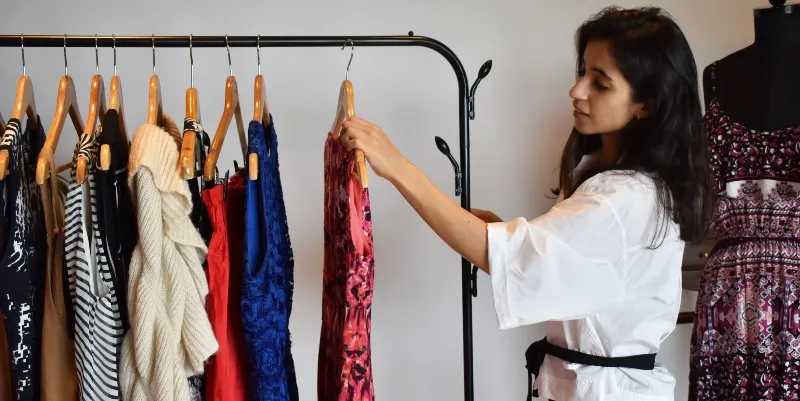Earth Day: Why actor Bhumi Pednekar is opening up her wardrobe for ‘pre-loved’ fashion brand Dolce Vee
Dolce Vee, by social enterprise SaltScout, is a new ‘pre-owned’ or ‘pre-loved’ fashion brand. On Earth Day, actor Bhumi Pednekar is launching the brand and its special environmental footprint calculator.
In 2018, while Komal Hiranandani was pursuing her master’s at Cornell, she felt sustainability and sustainable efforts needed to be brought to the forefront. For the next three years, she and her husband Siddharth Sah worked on building SaltScout, which aims to make being eco-friendly more accessible and engaging for people.
“I felt that consumption patterns we follow today leave one of the biggest carbon footprints on the planet. And it was difficult to find options that were socially conscious that were eco-friendly,” she says.

Bhumi Pedneker
Cut to three years later, this Earth Day, SaltScout is launching Dolce Vee, a brand that focuses on pre-owned, or as the team calls it, ‘pre loved’ fashion, in association with Bhoomi Pednekar.
Today, actor and climate warrior Bhumi launched the Dolce Vee Environmental Footprint Calculator. For the first time, when you buy a piece of pre-loved clothing, you will also be able to see the estimated water and carbon savings associated with it.
“We wanted to launch the brand with the footprint calculator because the environmental focus and sustainability is key,” adds Komal.
The most recent pair of jeans processed by the company saves an estimated 1,826 litres of water, which is about as much as a person drinks in a year, and an estimated 4 kg of carbon dioxide or equivalent greenhouse gases, which is roughly equivalent to driving a car for 23 km.
All these savings from just buying a single pair of pre-owned jeans over a newly manufactured one.
The Dolce Vee Environmental Footprint calculator is built in partnership with The Centre for Environmental Research & Education (CERE).
In the coming weeks, Bhumi will share pieces from her own wardrobe that will be up for a charity sale for fans to choose and buy. She is scheduled to go live on Instagram on April 22 for an interactive session to give a live demo of how the calculator works, and fans can also send in information on their clothes for a real-time assessment.
Eco-friendly — the accessible way
Speaking of her association with Dolce Vee, Bhumi says,
“I’ve been so happy to give pieces from my wardrobe a new life, and to launch this calculator so you can see your very real impact by choosing pre-loved.”
Calling to all climate warriors, she adds, “And now, climate warriors, it's your turn. If you have good condition clothing and accessories that you'd like to share, you can donate them for a charity sale too. Just DM the Dolce Vee Instagram handle, and we can sort out doorstep pick up from you, wherever you are across India. What's more, you will even be given an estimate of the water and carbon savings arising from your contribution.”
In the last three years, Komal and Siddharth have worked on the charity sales of several celebrity wardrobes, and other projects, like special product lines with compelling stories behind them to get people excited about this space.

Founders of Dolce Vee - Komal and Siddharth
Komal says, "The partnership with Bhumi happened very organically. We had, of course, been seeing her social initiatives for a while, and appreciated her genuine commitment to the cause. In particular, she focused on making eco-friendly living understandable and relatable, which is exactly what we are working to do. Showing small behavioural changes and how they can have an exponential positive impact. So, the synergy was perfect.”
Previously, SaltScout has worked with NGO Jai Vakeel, which supports individuals with Intellectual Developmental Disability, and sold upcycled "Inclusion Bands" to raise awareness and funds for their work.
When SaltScout was launched, one of its main verticals was the charity sales of pre-loved celebrity wardrobes. But the founders also worked on other projects, like special product lines with compelling stories behind them, to get people excited about this space.
Its other products include facemasks with the proceeds supporting the COVID-19 resilience efforts of Child Rights and You, and upcycled decor products made from waste created during the footwear production process.
As their work in pre-loved fashion grew, the duo felt the need to create another sub-brand to house celebrity fashion so that customers could have a clear differentiation between pre-loved items and the other products, and to create something that looked and felt more like a fashion brand.
Not new but different
Pre-loved fashion is not new but Dolce Vee isn't talking about thrift stores or the ritual of inheriting special pieces from our elders.
Komal explains, “Somehow, celebrity wardrobes feel that way. People might buy pre-loved items from a Bhumi Pedneker. This transition is at the very heart of what we are doing. To bring pre-loved shopping into every home, we have to embark on a long journey, and our effort has to be multi-pronged. The fact that leaders in Indian cinema have embraced this cause has gone a long way towards making it more accepted, and we've been so heartened to see them use their voice to nudge this essential behavioural change.”
Another important pillar is environmental awareness, and helping customers feel the impact of doing social good when they shed any stigma they may have about preloved. Because they truly are doing social good.
“Our Environmental Footprint Calculator shows customers how much they are tangibly contributing by opening their hearts and their wardrobes to preloved pieces. With every piece of clothing they buy, they have the facts in front of them - how many litres of water and how many kgs of carbon are saved by buying that piece preloved over newly manufactured,” explains Komal.

Komal
The majority of proceeds from each sale support a charity, and that's been important for many people when they're first introduced.
Komal explains different people will be attracted by different things — some by exciting finds from influencer closets, some by the lower price tags of our pieces, some by the environmental benefits, some by the chance to support a charity through their purchases. Thus there was a need for a fashion destination.
She says the consumer base is diverse — from students, young professions, older working women to homemakers from across the country and even abroad.
“We went into this thinking our customer would be an 18-28-year-old female in a Tier-I or a Tier-II city, but that demographic has ended being only a fraction of our audience. And the diversity of the audience base is one of the signs we looked at to inform our decision about how to take the next step towards growing preloved,” she adds.
Clean and pre-loved
It was also important to ensure that customers receive clean and safe clothing. However, cleaning processes, like using machine dryers, can be resource-intensive and leave a heavy environmental footprint. Therefore, it was important to make the cleaning eco-friendly.
Komal explains they used natural cleaning materials and air drying to keep the clothes clean. “But we do make sure everything is clean and sanitised when it reaches us. Of course, depending on the fabrics and condition of the garments, we have to process each piece differently,” says Komal.
SaltScout tries to keep its own carbon footprint to the minimum.
“For instance, we printed our tags on recycled paper with ink made from industrial waste. We are constantly seeking to find better ways of doing things, and tread lighter in all our processes,” adds the founder.
More than the age of an item, the team focuses on its condition, and even if it is an unbranded piece, it is the life left in the product that ultimately matters.
“If it's in good condition, we are very happy to accept clothes of any age. In fact, some of our best pieces are vintage-wear that are over 30 years old because the quality of garment making was so exquisite back then — things were really made to last,” she adds.
Market and future
Komal explains it also was important to ensure that the products were priced right. While the base prices start from Rs 1,500, some items can even go up to Rs 25,000 like an Anarkali set by Anushka Sharma.
“To make it mass, it is important to ensure the pricing isn’t too high,” she adds. According to UN Comtrade data, the import of used clothes in India is worth $182 million, making India the top importer in this category.
Other startups in this space include Elanic, Revamp My Closet, Once Again, and Etashee, but some have either died or pivoted. In fact, Elanic was recently acquired by Twitter. The segment has had a tough ride because of the cultural biases around pre-owned clothes.
Attesting to this Komal says that adding celebrity fashion to the mix is helping things shift in the right direction.
“The initial days were tough. People don’t understand the idea of pre-loved fashion. There are cultural, religious, and spiritual reasons for that. So, we had to start with something that would change people’s mindsets. In India, film stars are trendsetters, and what they do is important. So, teaming up with them helped,” she explains.
Edited by Saheli Sen Gupta



![[Startup Bharat] Jaipur-based Kirana King aims to give local kiranas the tech and reach of organised retail](https://images.yourstory.com/cs/2/a9efa9c02dd911e9adc52d913c55075e/Imagehyen-1618310687809.jpg?fm=png&auto=format&h=100&w=100&crop=entropy&fit=crop)
![[Startup Bharat] Ikea's sustainable range gets a South Indian touch in collaboration with Industree in Madurai](https://images.yourstory.com/cs/2/a9efa9c02dd911e9adc52d913c55075e/Startuo-bharat-ii-22-1579691228243.png?fm=png&auto=format&h=100&w=100&crop=entropy&fit=crop)






